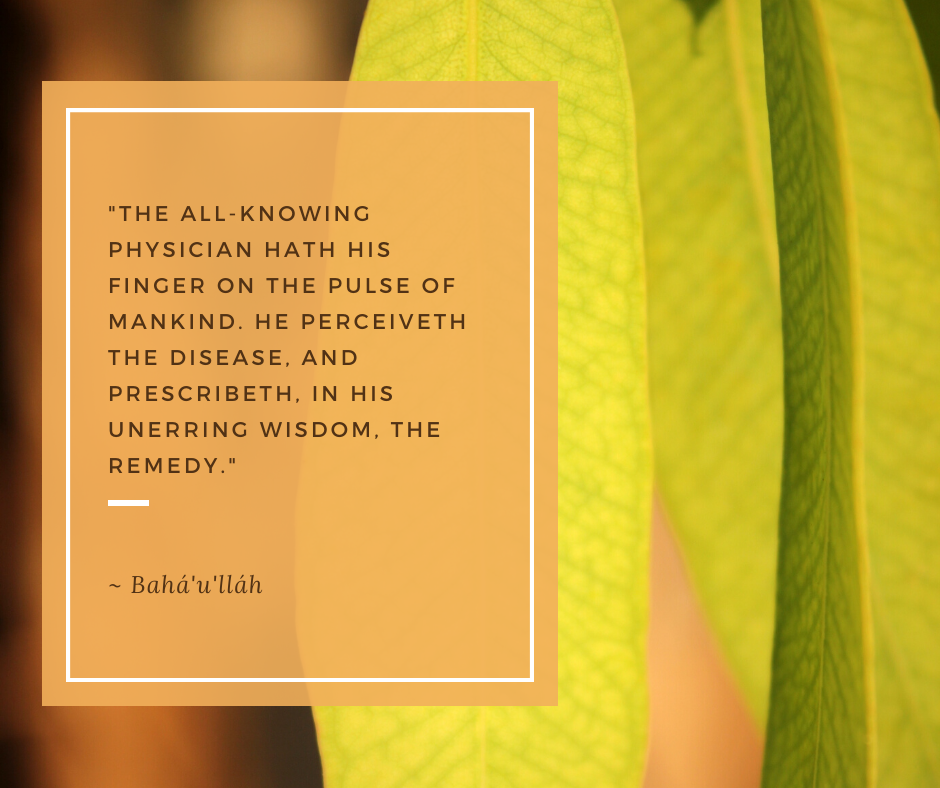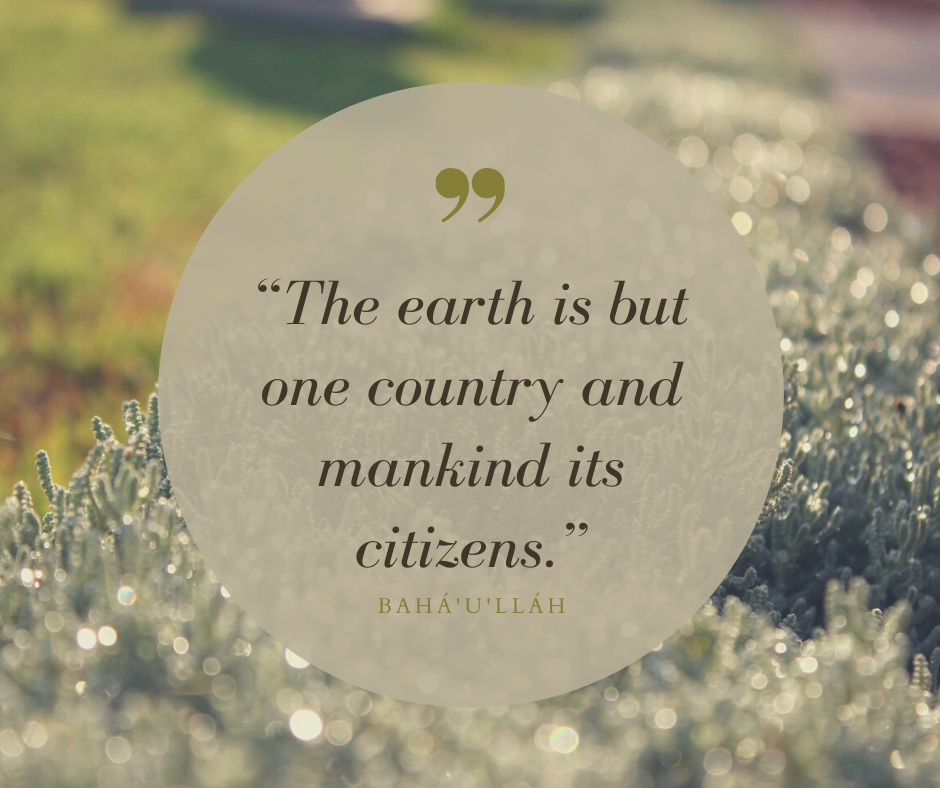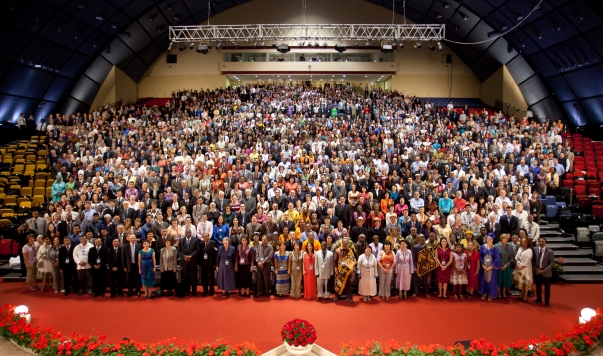Today, Bahá’ís worldwide, celebrate the Declaration of the Báb. This annual event commemorates the founding of the Bábí Movement, the precursor to the Bahá’í Faith. It is one of 9 Holy Days every year during which work is suspended. Following what have been some extremely busy few weeks, I finally had some time to sit down again and reflect on the current condition of the world. Hence, I started to think about what we can do to prevent the next global crisis.
What it is that led us to an almost global lockdown? What caused this pandemic that has shaken our way of living to its very core? Countless lives have been lost, entire economies have been wrecked, and the future seems very uncertain for the vast majority of the world’s population.
Introduction:
What prompted my reflections?
Before I express my thoughts, I would like to point out that I am not seeking to make any politically biased statements on the source of this outbreak. Nor do I wish to judge the scientific merits of the theories that I mention. In fact, I am not trying to come to a conclusion as to how the virus was transmitted to the first human. On the contrary, I am just putting my thoughts on paper with regards to two common theories that I have seen circulating in the media.
While they both point to China, I believe that China is the country of the future, and while this time it seems to have been the source of the outbreak, tomorrow it could be any other country.
Rather than assigning blame to any one country or regime, I seek to explore how some of the Teachings that the Báb and Bahá’u’lláh brought to mankind could have prevented this situation. I believe that these teachings can help shift our way of thinking and acting to help reduce the impact of future catastrophies.
Reflections:
Could we have prevented this global crisis?
A scientific catastrophy
News articles have started to appear that report on efforts by UK & US intelligence bodies to try and establish how the virus was first transmitted to humans. The theory being pointed at suggests that the Wuhan Institute of Virology, which played a key role in identifying the virus which we now call COVID-19, may in fact have been responsible for releasing it in the first place.
Should this have been the case, the question has been posed as to why its spread was not curbed. Assuming that there was no malignant intentions in terms of a biological warfare, another explanation that is circulating is that the government did not want the research that was being done to be known, and thus tried to cover it up.
So here we potentially have a case of groundbreaking scientific research involving a genetically modified virus. As long as the research abides by the laws of the country, or is sanctioned in some way by the regime, it is permitted to take place. However, is this right? Most people would agree that there ought to be some ethical considerations at play for any scientific research. Bahá’u’lláh goes further than this and calls for the harmony of science and religion itself. ʻAbdu’l-Bahá, the Son and authorised Interpreter of Bahá’u’lláh, further elucidates:
“Religion and science are the two wings upon which man’s intelligence can soar into the heights, with which the human soul can progress. It is not possible to fly with one wing alone! Should a man try to fly with the wing of religion alone he would quickly fall into the quagmire of superstition, whilst on the other hand, with the wing of science alone he would also make no progress, but fall into the despairing slough of materialism.”
https://www.bahai.org/library/authoritative-texts/abdul-baha/paris-talks/5#542194845
There are some values that almost all world religions promote. These include truthfulness, trustworthiness, and justice. It is evident that adhering to these virtues would allow us to contain the spread of the virus and minimise the potential damage caused by one in the future.
A question to consider as a generic point is the possibility governments in the future deciding to invest in biological warfare research programme. The Bahá’í Faith calls for universal peace, a necessary requirement for which is justice. If we were to view all humanity as one, our worldview would shift from one of wanting to pursue the interests of our nation, to rendering service to humanity as a whole. Embracing this principle now could thus help save thousands of lives in the future.
“Justice is not limited, it is a universal quality. Its operation must be carried out in all classes, from the highest to the lowest. Justice must be sacred, and the rights of all the people must be considered. Desire for others only that which you desire for yourselves. Then shall we rejoice in the Sun of Justice, which shines from the Horizon of God.”
https://www.bahai.org/beliefs/universal-peace/quotations
A natural catastrophy
Now let us turn to another theory, which would make us look at the current pandemic as a natural catastrophy. The theory says that the virus spread to humans through the wet markets. The corona virus then jumped form a bat to an unknown species, which was consumed by humans, and that constituted the genesis of the chain reaction.
It appears that what would have allowed the pandemic to assume global proportions under this theory stems from an interplay between traditions & culture on the one hand, and a country’s laws on the other. Presumably, had wet markets been banned years ago as many activists have been calling for, the virus transmission to humans would not have occurred.
Once more, I do not wish to argue whether wet markets per se should or should not be banned. However, presuming that there are good arguments for closing them down, why was this not done until recently? Presumably individuals were too attached to their own wants and desires, so as not to be able to objectively see the effects of their actions.
What I believe is required in such cases is to transcend a narrow, self-centred view, and to strive to desire that which is conducive to the common weal of a global society.
Comparison
Perhaps in both the cases analysed above, we can see certain parallels between the interaction of science and religion on the one hand, and laws and culture on the other hand. In the former case, scientific endeavours unchecked by religious standards, seem to have been the cause for the spread of the pandemic. In the latter, cultural traditions unchecked by a government’s legal framework, provided the pathway for the virus to conquer the world.
A takeaway from both these possibilities is that we need to rethink at a very basic level the interactions and power dynamics between various factors in our society. Whether this be science and religion, laws and culture, or individual rights and the common weal, a framework is required according to which everything can be weighed up and a correct balance can be struck. But how are we to obtain such a framework?
A human catastrophy
While it is not certain which of the above theories, or perhaps some other theory, actually holds true, what I am absolutely convinced of, is that the root cause of the situation we find ourselves in today is, in fact, a human catastrophy. Whether the roots of this catastrophy were scientific or natural as described above, either would be but one of many outcomes of a single human catastrophic decision. For if this decision had been taken correctly, whichever the cause of transmission of the virus to the first human, the spread would have been controlled and the consequences would have been minimised compared to what we see today.
Almost two centuries ago, Bahá’u’lláh proclaimed the need for humanity to adopt a new set of principles to guide it on its path towards its collective maturity. The worldwide adoption of these principles would have helped us prevent many a tragedy to date. For example, the principle of the harmony of science and religion, if fully enacted, could have helped prevent the current outbreak as explained above. But why did we humans reject Bahá’u’lláh’s healing message? One of the reasons that is mentioned in the Bahá’í Writings, is the influence of leaders of religions of former times.
“All religions of the present day have fallen into superstitious practices, out of harmony alike with the true principles of the teaching they represent and with the scientific discoveries of the time. Many religious leaders have grown to think that the importance of religion lies mainly in the adherence to a collection of certain dogmas and the practice of rites and ceremonies! Those whose souls they profess to cure are taught to believe likewise, and these cling tenaciously to the outward forms, confusing them with the inward truth.”
https://www.bahai.org/library/authoritative-texts/abdul-baha/paris-talks/5#542194845
However, this was not the only reason for its rejection. Each individual has been endowed with the ability to reason independently. It appears to me that there is another parallel that can be drawn that can help us prevent the next global crisis. In parts of the Western world, there seems to be an inbalance between science and religion at a societal level. This finds expression in a prejudice against religion. At an individual level, I believe we need to look objectively at the balance between faith and reason.
Are we, professing to be the masters of reason, actually succumbing to the historically founded, yet not entirely reasonable, prejudice against religion? If dispassionately weighed, we will find that it is part of the solution to the world’s problems. I invite you, dear reader, to consider the arguments brought by Bahá’u’lláh in their purest form, and decide for yourself.
“This humble servant is filled with wonder, inasmuch as all men are endowed with the capacity to see and hear, yet we find them deprived of the privilege of using these faculties. This servant hath been prompted to pen these lines by virtue of the tender love he cherisheth for thee. The winds of despair are, alas, blowing from every direction, and the strife that divideth and afflicteth the human race is daily increasing. The signs of impending convulsions and chaos can now be discerned, inasmuch as the prevailing order appeareth to be lamentably defective. I beseech God, exalted be His glory, that He may graciously awaken the peoples of the earth, may grant that the end of their conduct may be profitable unto them, and aid them to accomplish that which beseemeth their station.”
https://www.bahai.org/library/authoritative-texts/bahaullah/tablets-bahaullah/5#041830557
Alongside the above principle, Bahá’u’lláh provided an entire blueprint for the regeneration of mankind. Referring to a sublime God, He says:
“The All-Knowing Physician hath His finger on the pulse of mankind. He perceiveth the disease, and prescribeth, in His unerring wisdom, the remedy. Every age hath its own problem, and every soul its particular aspiration. The remedy the world needeth in its present-day afflictions can never be the same as that which a subsequent age may require.”
https://www.bahai.org/library/authoritative-texts/bahaullah/tabernacle-unity/3#553038498
Bahá’u’lláh brought this panacea to the world. However, the majority of the people living in His lifetime, rejected His plea for justice, peace, and world unity. In doing so, and ignoring His call, we opened the way to the further degradation of an already lamentably defective world order.
When will we, a single humanity, wake up to the reality that there is no chance of survival save by overcoming our differences and uniting as one family?
“Were man to appreciate the greatness of his station and the loftiness of his destiny he would manifest naught save goodly character, pure deeds, and a seemly and praiseworthy conduct. If the learned and wise men of goodwill were to impart guidance unto the people, the whole earth would be regarded as one country. Verily this is the undoubted truth. This servant appealeth to every diligent and enterprising soul to exert his utmost endeavor and arise to rehabilitate the conditions in all regions and to quicken the dead with the living waters of wisdom and utterance, by virtue of the love he cherisheth for God, the One, the Peerless, the Almighty, the Beneficent.”
https://www.bahai.org/library/authoritative-texts/bahaullah/tablets-bahaullah/5#041830557
Conclusion:
How can we prevent future global crises?
Clearly, the effects of the lack of a global response to this pandemic in exasperating the suffering worldwide has become obvious. Unless we are able to provide a global, unified response to delicate situations now and in the future, this surely will not be the last catastrophy in our lifetime.
“The world is in travail, and its agitation waxeth day by day. Its face is turned towards waywardness and unbelief. Such shall be its plight, that to disclose it now would not be meet and seemly. Its perversity will long continue. And when the appointed hour is come, there shall suddenly appear that which shall cause the limbs of mankind to quake. Then, and only then, will the Divine Standard be unfurled, and the Nightingale of Paradise warble its melody.”
https://www.bahai.org/library/authoritative-texts/bahaullah/gleanings-writings-bahaullah/4#907560389
Whether we be worried about climate change, a nuclear war, or indeed, biological warfare, each one of us better get up now and do something. While the bright end is unquestionable, the amount of suffering that mankind will need to endure in the process of getting there, now depends solely on each one of us.
“World peace is not only possible but inevitable. It is the next stage in the evolution of this planet—in the words of one great thinker, “the planetization of mankind”.”
https://www.bahai.org/documents/the-universal-house-of-justice/promise-world-peace
So how can we, as individuals, contribute to processes that could help us prevent the next global crisis?
“Be anxiously concerned with the needs of the age ye live in, and centre your deliberations on its exigencies and requirements.”
https://www.bahai.org/library/authoritative-texts/bahaullah/tabernacle-unity/3#553038498
Worldwide, Bahá’ís and likeminded souls, are striving to bring about a process of transformation at the grassroots of every neighbourhood and village. This movement of global proportions seeks to ensure that the material and spiritual progress of every people and nation on this planet is enabled and supported as part of one human family.
“Is not the object of every Revelation to effect a transformation in the whole character of mankind, a transformation that shall manifest itself, both outwardly and inwardly, that shall affect both its inner life and external conditions? For if the character of mankind be not changed, the futility of God’s universal Manifestations would be apparent.”
https://www.bahai.org/library/authoritative-texts/bahaullah/kitab-i-iqan/9#501261243
To find out more about how you can play your part in averting the next global crisis and in offering a lasting contribution to the fortunes of mankind, click here.
Should you be interested in exploring my thoughts on the oneness of mankind and some other lessons that we can take from this pandemic, you may wish to take a look at my previous blog post.



